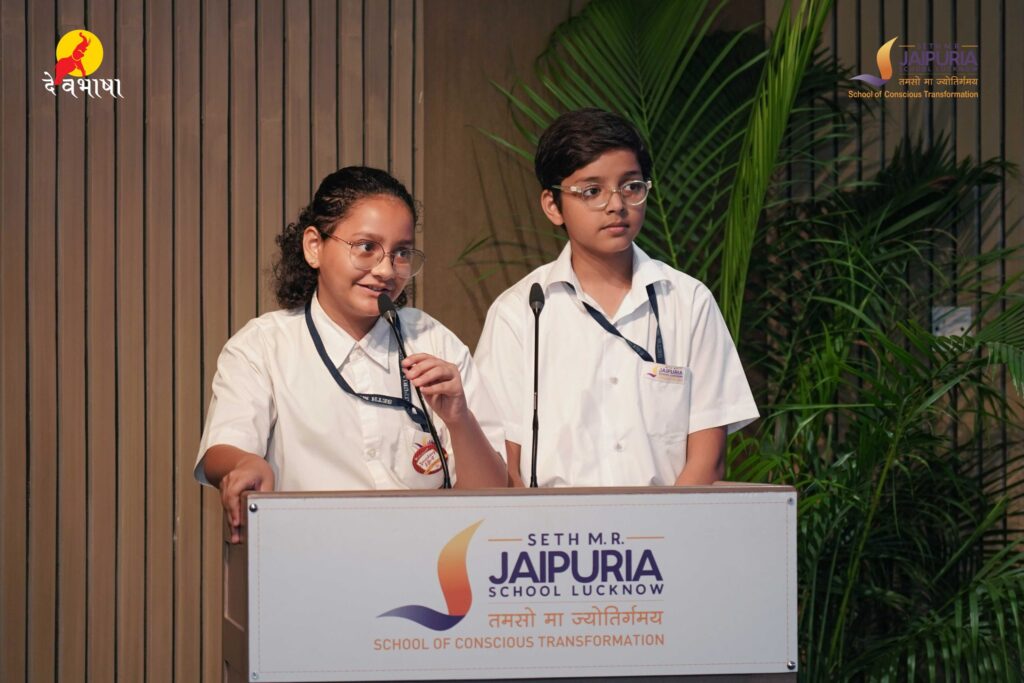Devabhasha Sanskrit curriculum has been devised by Integral Publishers for schools to teach conversational Sanskrit from Playgroup to Class VIII. Through Devabhasha, the aim is to empower every child with the ability to understand and converse in Sanskrit.
It is often wrongly argued that Sanskrit is a difficult language to learn, and that even after studying it for a considerable period, one does not acquire adequate proficiency. However, if taught at an early age using the right pedagogy, students can become as conversant in Sanskrit as in any other language.
Research concludes that the optimal age for learning a new language with ease, fluency, and near-perfect accent is from birth to six or seven years. When introduced later, it becomes significantly more difficult.
The Devabhasha curriculum has been designed to address this specific gap in Sanskrit education in India. It is introduced from Playgroup and continues up to Class VIII, based on the premise that just as an infant learns their mother tongue effortlessly, they can similarly acquire multiple languages spontaneously and with ease when taught during the early learning years in Kindergarten.

In conventional Sanskrit education, two major lacunae stand out.
First, Sanskrit is introduced too late—typically in Class 6 and often discontinued by Class 8—missing the critical language acquisition window from birth to age six, when children absorb new languages naturally, with fluency and ease.
Second, Sanskrit is often reduced to a dry academic exercise focused on grammar rules, rote memorization, conjugation tables, and translation tasks, usually taught through Hindi. This method sidelines conversation and the lived experience of the language, leaving students with neither fluency nor meaningful access to its rich cultural and literary heritage.
The Devabhasha Curriculum addresses these two gaps with a refreshing, research-based approach.
Firstly, it introduces Sanskrit from Nursery onwards, when students are around three years old—an age scientifically validated for natural language absorption.
Secondly, Sanskrit education in the Pre-Primary years is made engaging and joyful. Children learn through games, songs, stotras, rhymes, and stories, while absorbing basic vocabulary such as numbers, colours, animals, and body parts. This play-based immersion fosters a natural affinity for Sanskrit.
As students progress to higher classes, the Devabhasha Curriculum systematically develops skills in spoken Sanskrit, along with writing, translation, paraphrasing, and idiomatic usage. Learning is further enriched through songs, stories, poems, biographies, and interactive games—making the journey vibrant, experiential, and memorable.
From Grade 1 onwards, students begin memorizing and understanding mantras, stotras, and verses from the Vedas, Upanishads, and the Srimad Bhagavad Gita. This transforms them into living anthologies of Bharatiya culture and tradition, imbibing values organically through a subtle and inspiring journey.
This comprehensive approach ensures that Sanskrit is not merely studied—but lived—reconnecting learners with the cultural, literary, and philosophical wealth of this timeless language.
Duryodhana said, “Dharmamjanami na cha me pravrittih, adharmamjanami na cha me nivrittih,” “I know what is dharma or the right action but I don’t have the inclination to practice it. I know what is adharma or the wrong action but I do not possess the inclination to be free from it.” The overarching question arises – what is the pedagogy that will chisel such a personality that not only knows right from wrong, but also possesses the strength of will to choose the right and practice it?
Educationists world over are searching for a pedagogy that instills values in students.
Our forefathers had mastered the art of value education wherein they taught mantras and prayers in gurukuls. Why should we reinvent the wheel? In Devabhasha, we have made an attempt to introduce Subhashita Literature which heightens, widens and deepens the consciousness. The last chapter in Devabhasha is Divyavani which has beautiful mantras and other invocatory shlokas, so that the children are exposed to values which must be embedded from childhood, for example – developing respect and regard for everybody, invoking a sense of responsibility for the environment.

Copyright © 2025. All Rights Reserved